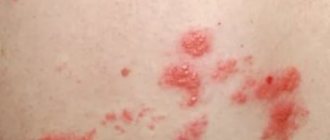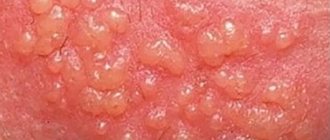Herpesvirus diseases are one of the most pressing problems of modern medicine. According to existing estimates, the infection rate of the population with herpes viruses is close to 100%. This is confirmed by modern sero-epidemiological studies, which show that today over 90% of the adult population have antibodies to a virus of one type or another1. Against this background, scientists’ search for the most effective remedies for herpes becomes especially relevant.
- Causes of herpes
- Types of drugs for herpes on the lips
- Medicines for herpes in the intimate area
- Are folk remedies suitable?
Doctors of many specialties encounter diseases caused by viruses of the Herpesviridae family in their practice. Currently, 8 antigenic serotypes of viruses are known: herpes simplex viruses types 1 and 2, chickenpox - herpes zoster, cytomegalovirus, Epstein-Barr virus, viruses 6, 7 and 8 types. Herpes viruses can infect almost all organs and systems of the host body, causing latent, acute and chronic forms of infection.
According to some experts, this virus, in association with chlamydia, mycoplasma and human papillomavirus, can take part in the development of such dangerous diseases as cervical cancer and prostate cancer. The virus also has an adverse and sometimes fatal effect on the course of pregnancy and childbirth and can lead to pathologies in newborns.
Causes of herpes
The source of infection is not only a sick person in the acute stage of the disease or during an exacerbation of the recurrent stage of a chronic infection, but also carriers of the virus who once encountered symptoms of herpes and could forget about them, and are now carriers. In this case, they speak of a latent, “hidden” course of the disease. Among the most common routes of transmission of the virus are: contact, airborne droplets, sexual and vertical - intrauterine infection of the fetus during pregnancy. A baby can also become infected during childbirth if its mother is infected. Infection occurs when the virus enters the mucous membranes or skin, where it immediately penetrates and begins its destructive activity.
Dishes, bedding, toys - all these items can be carriers. And even if a person is already sick, after symptoms appear, he can spread the infection with his hands to other parts of the body. For example, transferring herpes from the lips to the genitals.
The incubation period (the time from the moment of infection to the onset of the disease) can last from 1 day to three weeks and depends on the state of the person’s immune system.
Provoking factors that lead to relapse of herpes:
- bacterial and viral infections;
- weakened immunity;
- frequent stress;
- unhealthy diet, hypo- and avitaminosis;
- sudden weight fluctuations, exhaustion and obesity;
- overwork and heavy physical activity;
- use of low-quality cosmetics;
- excessive sun exposure.
In women, menstruation can also trigger a relapse of the herpes virus that “dormant” in the body.
How does infection occur?
Most often, infection occurs through close contact with a carrier (hugs, kisses, etc.). At the same time, the carrier himself may not realize that he is a carrier of the infection, since manifestations of the virus (bubble rashes on the mucous membranes) occur when the immune system is weakened, caused, for example, by attacks by ARVI or influenza viruses. A healthy person can become infected with this infection not only through direct contact, but also when using someone else’s personal hygiene items (towel, lipstick, cream, etc.) or utensils that the carrier had recently used. The mechanism of virus penetration into the body is as follows: HSV does not remain on the surface, on the skin or mucous membranes, but is embedded in the DNA of nerve cells, thus remaining “invisible” to the human immune system. That is why there is no medicine that can “stop herpes forever.” This infection becomes noticeable when a person’s general immunity decreases, when the virus goes beyond the nerve cells and begins to multiply. This explains the exacerbation of the disease. It is at this point that the use of antiviral drugs, both local and systemic, is justified.
During the period of virus reproduction, the carrier becomes the most dangerous to others. But this does not mean that any direct contact with an infected person leads to infection of another person. For herpes to enter the body, the following conditions are necessary:
- Damaged skin: with wounds, scratches, cracks, allergic manifestations;
- Contact of mucous membranes with the carrier (kiss);
- Decreased immune defense.
Types of drugs for herpes on the lips
The well-known “cold” on the lips is manifested by the appearance of rashes in the form of bubbles filled with liquid contents, which can merge with each other. At the first stage of the disease, this may be accompanied by itching, redness and swelling at the site of formation of blisters, fever, headache and general malaise. Gradually, the bubbles open, dry out, and a crust forms in their place.
Most often, those infected with herpes simplex virus (HSV) are offered treatment on an outpatient basis. But in severe cases of the disease and the development of complications, the patient is indicated for hospitalization in a hospital.
The action of medications against “colds” on the lips is aimed at reducing the intensity of symptoms by blocking the multiplication of the virus, improving overall well-being, shortening the period of the disease and minimizing the number of relapses.
Pills
Herpes tablets are a group of antiherpetic drugs used, among other things, to treat “colds” on the lips. Today, the pharmaceutical market offers many tablet drugs that are aimed at combating the disease. The mechanism of their action is that after entering the gastrointestinal tract, the tablet disintegrates, the active substance is released and spreads throughout the body with the blood. The active components act on the DNA of the virus and stop its reproduction, and the remaining pathogenic microorganisms die under the influence of immunity.
The most common systemic (acting on the whole body) drugs for the treatment of herpes are drugs based on acyclovir and its derivatives. Most often, such drugs are available in the form of tablets of various dosages. These drugs have long been used to treat herpes virus infections, which probably explains the high percentage of resistance (insensitivity) of herpes viruses to them.
As a rule, most antiherpetic tablet drugs belong to a very serious group of pharmacological drugs and have many contraindications and side effects. They can be taken only after consulting a doctor and strictly following the instructions.
To make the treatment more effective, most often the doctor prescribes tablets against herpes infection in combination with means for external use.
Gel and ointment
Medicines produced in the form of a gel or ointment have a number of advantages:
- topical agents allow you to achieve the highest concentration of active substances directly in the affected area;
- ensure the prevention of the spread of the virus to healthy areas of the skin;
- have a high degree of tolerability and have a minimal risk of causing side effects;
- help to achieve rapid relief of symptoms even in advanced stages of the disease.
Most anti-herpes medications, available in gel and ointment form, are quite easy to use and can be used several times a day as needed. If necessary, when treating a “cold” on the lips, it is possible to combine several medications that differ in the principle of action (for example, tablets or suppositories in combination with ointment or gel), which will help achieve a more pronounced effect.
Valtrex
An effective antiviral drug with an active substance called valacyclovir. Helps relieve all types of herpes: oral, genital, chickenpox and shingles. Intended for the treatment of patients over 12 years of age. Available in the form of tablets and liquid solution.
During the therapy period, it is important to dose the amount of medication and strictly follow the instructions, since valacyclovir acts on the nervous system, liver and kidneys. Side effects include: headaches, insomnia, shortness of breath, arrhythmia, decreased appetite, nausea and vomiting.
Drugs for genital herpes
Genital herpes is part of the group of sexually transmitted diseases. It makes itself felt by the appearance of a rash in the form of a group of blisters, and then erosions and ulcers in the genital area. All this is accompanied by itching, burning, swelling, redness of the affected areas and general intoxication. This type of virus is prone to recurrence and can lead to complications. In pregnant women, it increases the likelihood of miscarriage and the development of various pathologies in the fetus.
As with lip symptoms, tablets, ointment and gel are also most commonly used for genital symptoms. Tablet drugs act on the body from the inside, the active substance is distributed through the bloodstream to all organs and tissues, and for local therapy, external agents are used that provide healing of rashes and significant relief from the manifestations of the disease.
Treatment of herpes with folk remedies
The widespread desire for the most “harmless” treatment, when a person chooses therapy methods for himself and relies on traditional medicine, refusing the help of doctors, can lead to unpredictable results. All drugs recommended by representatives of official medicine have undergone fundamental scientific research with monitoring of the condition of various groups of patients. As a result, patients are offered only the safest drugs that have already shown their effectiveness.
In the case of a folk remedy, the recipe for which the patient found on the Internet and decided to immediately use, no one can vouch for the favorable outcome of such treatment. Treat any traditional medicine recipes with caution, even if the remedy has helped someone and you have heard positive reviews about it from your friends and relatives.
Any tinctures, decoctions and self-made creams from medicinal plants and other ingredients can cause severe allergies, not alleviate, but rather intensify the manifestations of the disease and even lead to severe poisoning. The thing is that any active substance is both a poison and a medicine at the same time, it all depends on the dose and correct use. And a person without medical education takes a great risk by inventing home remedies for “colds” on the lips and genital herpes. There is no way to quickly cure the disease this way.
Also, few people know that many components of traditional medicine recipes can interact with medications. And this does not always benefit the patient. Therefore, if you took a drug purchased at a pharmacy, and then suddenly decided to use an application from what you found in the refrigerator for a faster effect, the result may be the development of complications that will require hospitalization. You should not take risks and start treating “colds” on the lips and intimate herpes with folk remedies.
What to choose for the treatment of herpes on the lips and intimate area?
To treat herpes, among other medications, interferon-based immunomodulators are used - drugs that correct immunity parameters and increase the body's resistance to infectious diseases. Among such drugs is the antiviral drug with an immunomodulatory effect VIFERON, which is available in the form of Candles (suppositories), Gel and Ointment.
It contains human recombinant interferon alpha-2b, suppresses the activity of viruses and increases the body's own immune response. When using the drug in the form of suppositories, the liver and stomach do not experience additional stress, which is very important for young children, people suffering from gastrointestinal diseases, including gastritis, as well as for older people and those who take several drugs at the same time
The drug VIFERON Suppositories acts carefully - it is approved for children from the first days of life, expectant mothers from the 14th week of pregnancy and nursing women.
The recommended dose for adults is VIFERON Suppositories 1,000,000 IU, 1 suppository 2 times a day after 12 hours every day for 10 days or more for recurrent infections.
Children are prescribed VIFERON Suppositories 150,000 IU, 1 suppository 2 times a day every 12 hours every day for 5 days. According to clinical indications, therapy can be continued.
Pregnant women from the second trimester of pregnancy (starting from the 14th week of gestation) are recommended VIFERON® 500,000 IU, 1 suppository 2 times a day every 12 hours every day for 10 days, then 1 suppository 2 times a day every 12 hours every fourth day for 10 days. Then every 4 weeks until delivery VIFERON® 150,000 IU, 1 suppository 2 times a day after 12 hours every day for 5 days. If necessary, it is indicated before delivery (from the 38th week of gestation) VIFERON® 500000 IU, 1 suppository 2 times a day after 12 hours every day for 10 days.
For targeted fight against “colds” on the face and genital herpes, VIFERON Gel and VIFERON Ointment are used. The ointment has a hydrophobic base and is better absorbed on the skin, while the gel has a hydrophilic base and is better absorbed on the mucous membranes. During treatment, a strip of gel or ointment is applied to the previously dried affected surface 3-5 times a day. The duration of the course of treatment is 5-6 days. If necessary, the duration of the course is increased until clinical manifestations disappear.
VIFERON ointment and gel not only fight viruses, but also help improve local immunity, reducing the likelihood of relapse2.
Reference and information material
Author of the article
Belyaev Dmitry Alexandrovich
General doctor
- Khaldin A.A., Molochkov A.V. “Herpes viral lesions of the skin and mucous membranes (herpes simplex and herpes zoster", Educational and methodological manual for doctors, Moscow, 2013
- Haldin A.A., Chistik O.V., “New aspects in the treatment of herpes simplex”, Dermatology, 2009
Loading...
Take other surveys
Treatment of herpes in the intimate area with folk remedies: will traditional medicine help?
Traditional medicine existed in all periods of human history, and the experience of traditional healers multiplied over the millennia and was passed on from generation to generation. True, one cannot help but admit that today many of the recipes that our ancestors used have been lost and forgotten, and the assessment of traditional medicine by specialists is still ambiguous. What happens when treated with traditional medicine methods
Today, traditional medicine offers both rational methods, which, under certain conditions, can really help cope with various diseases, and irrational ones, which deserve critical evaluation by doctors. But this does not stop those who, instead of turning to a specialist, decided to help themselves on their own by testing the effectiveness of traditional medicine recipes. As a rule, such people will be disappointed - no decoctions, infusions, applications of medicinal herbs and other drugs prepared at home can help get rid of the manifestations of herpes in the intimate area. It must be remembered that refusal to see a doctor and lack of adequate treatment can lead to unpredictable consequences and the development of life-threatening complications.
Only antiviral drugs that not only relieve symptoms, but also fight the root cause of the disease can help reduce the severity and shorten the course of the disease.






